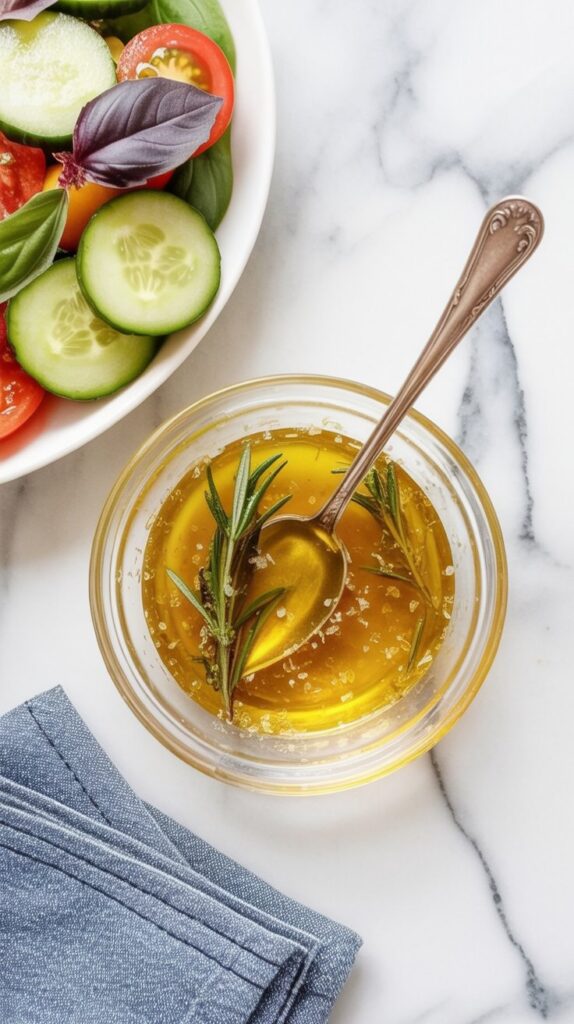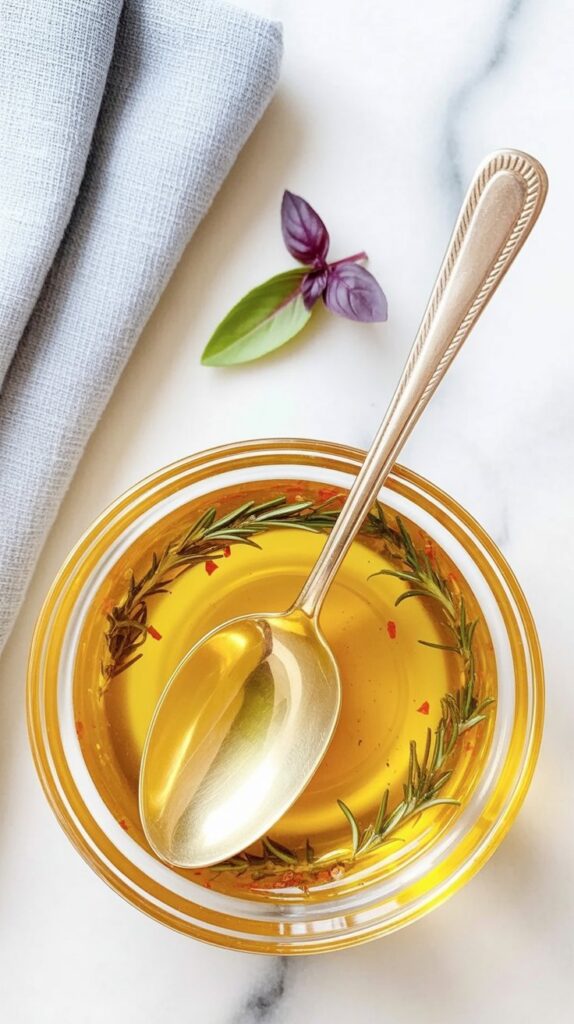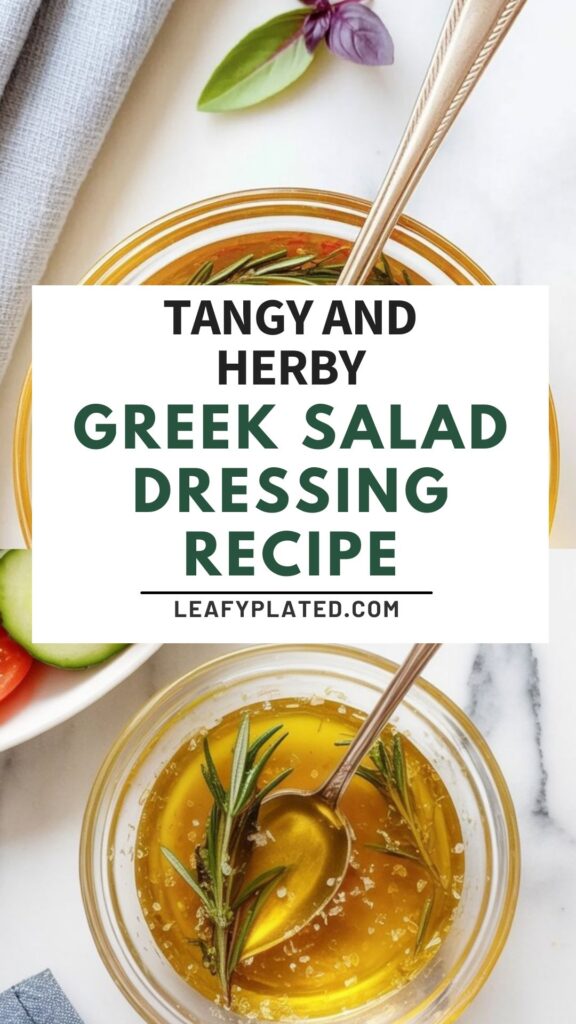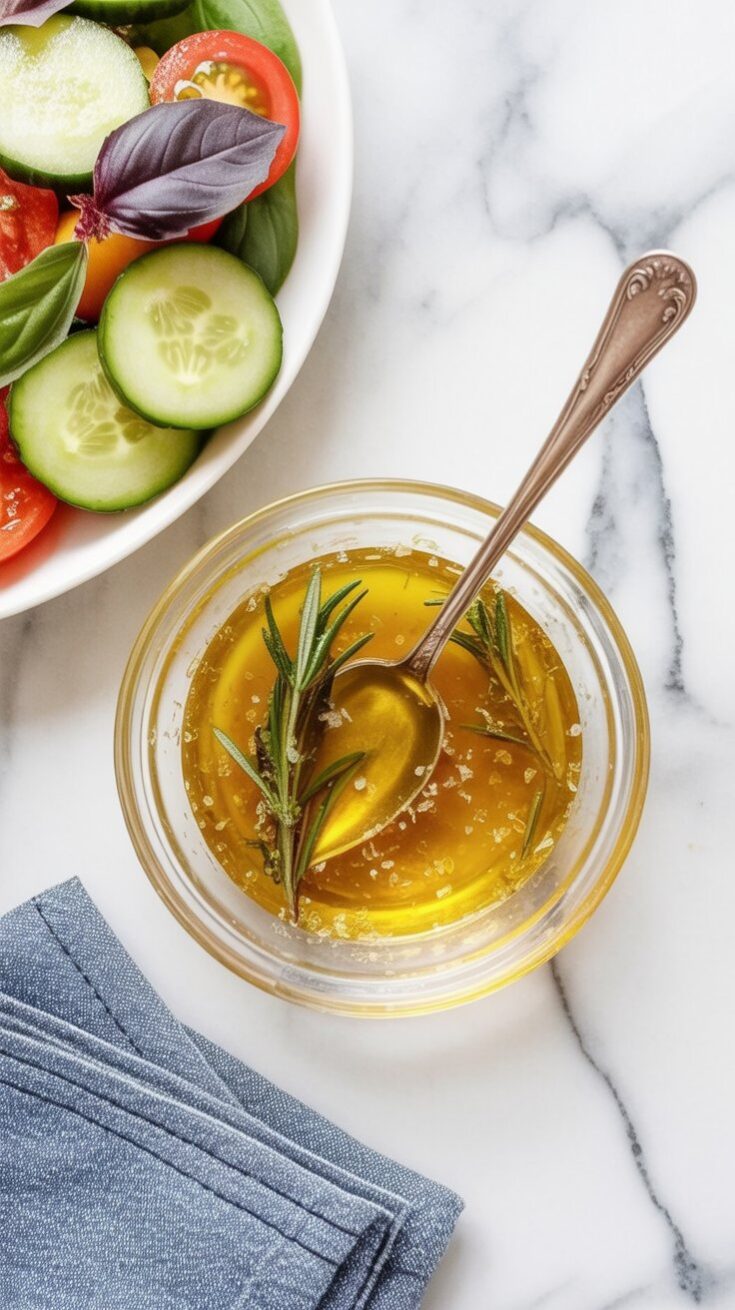Let’s be honest—most store-bought dressings just don’t cut it. They either taste flat, overly processed, or weirdly sweet. That’s why I always keep a jar of this homemade Greek salad dressing in my fridge. It’s bold, zesty, and brings life to whatever you drizzle it on.

I originally made this to go with a classic Greek salad (you know, the one loaded with crunchy cucumbers, juicy tomatoes, and briny olives). But I quickly realized it’s so much more than just a salad topping. I use it for grain bowls, roasted veggies, even as a marinade in a pinch. And the best part? It’s made with basic pantry ingredients I almost always have on hand.
If you’ve ever been disappointed by a bland salad, this is your fix.
What You’ll Need (Nothing Fancy, Promise)
This isn’t one of those dressings with 12 obscure ingredients you have to hunt down. You need just 7 everyday staples to make this work—and chances are, they’re already in your kitchen.
- Red wine vinegar – Adds that signature sharp kick. It’s bright and bold without being overpowering.
- Dijon mustard – Not just for sandwiches. This helps emulsify the dressing so it stays smooth, and it adds a subtle tang.
- Garlic – I grate it in fresh. One small clove goes a long way, but if you love garlic, don’t be shy.
- Dried oregano – This is what gives it that Greek flavor. I prefer dried here over fresh—more intense and earthy.
- Extra virgin olive oil – This rounds everything out with richness. Use the good stuff if you have it.
- Salt and pepper – Start small, then taste and tweak. I like a pinch of flaky sea salt and a good crack of black pepper.
Just whisk everything together in a bowl or shake it up in a small jar. That’s it. No blender, no mess.

Favourite Ways I Use This Dressing (Besides Salad)
I’ve tried this dressing on so many things that I’ve honestly lost count. Here are the ways it regularly shows up in my kitchen:
- Tossed with a Greek salad, obviously. It’s the classic combo that never gets old—tomatoes, cucumbers, red onion, feta, olives. Add some grilled chicken and you’ve got dinner.
- Drizzled over a cucumber-tomato salad in the summer. So simple, so fresh.
- Poured on a chopped salad loaded with romaine, peppers, and chickpeas. I sometimes skip the usual vinaigrette and reach for this instead.
- As a quick dressing for green salads when I want something punchy. It livens up even the plainest lettuce mix.
- Spoon it onto warm roasted veggies like cauliflower, Brussels sprouts, or potatoes. The heat brings out the garlic and oregano in such a lovely way.
- Grilled veggies love this too—zucchini, corn, even charred onions. I brush it on while they’re still warm.
- Tossed with cooked grains or beans. I’ll mix it into farro or lentils with some fresh herbs for a quick lunch salad.
Honestly, I’ve even dipped bread into it. No shame.
A Few Tips From My Kitchen
- Let the garlic sit in the vinegar for a minute before adding oil. It softens the sharpness just a bit.
- Taste as you go. Depending on the vinegar and mustard you use, you might want to add a pinch more salt or a splash more oil.
- Double the batch and keep it in the fridge. It’ll save you during busy weeks when you just need something to perk up leftovers.

How Long Does It Keep?
This dressing stays good in the fridge for about 5 days. I usually make a batch on Sunday and use it up through the week. Store it in a mason jar or any container with a tight-fitting lid. Just give it a shake before using, since it can separate a bit.
Greek Salad Dressing

This zesty homemade Greek salad dressing is one of those staples I always keep on hand. It’s tangy, garlicky, and full of Mediterranean flavor—perfect for tossing with crisp veggies, drizzling over grilled chicken, or spooning onto grain bowls. It comes together in just minutes with pantry ingredients, and honestly, once you try it, you might not go back to store-bought.
Ingredients
- 3 tablespoons red wine vinegar
- ¼ cup extra-virgin olive oil
- ¼ teaspoon Dijon mustard
- 1 small garlic clove, finely minced
- ½ teaspoon dried oregano (plus more for garnish, if you like)
- ¼ teaspoon sea salt
- Freshly cracked black pepper, to taste
- How to Make It
Instructions
- Start by grabbing a small bowl or a jar with a tight-fitting lid. Pour in the red wine vinegar and add the Dijon mustard, minced garlic, dried oregano, and sea salt. Give it a quick whisk to combine.
- Now slowly drizzle in the olive oil while whisking continuously until the dressing emulsifies and looks smooth. Season with freshly ground black pepper to taste.
- Taste and adjust—maybe a touch more vinegar for extra zing or a pinch more oregano for a bolder herb flavor.
Notes
- This dressing is a classic with a traditional Greek salad—think cucumbers, tomatoes, olives, and feta. But it’s just as lovely on a quinoa salad, roasted vegetables, or as a quick marinade for chicken. Store any leftover dressing in the fridge for up to 5 days and shake well before using.
Nutrition Information
Yield
6Serving Size
1Amount Per Serving Calories 83Total Fat 9gSaturated Fat 1gTrans Fat 0gUnsaturated Fat 8gCholesterol 0mgSodium 95mgCarbohydrates 1gFiber 0gSugar 0gProtein 0g
Leafyplated.com, occasionally offers nutritional information for recipes contained on this site. This information is provided as a courtesy and is an estimate only. This information comes from online calculators. Although Leafyplated.com attempts to provide accurate nutritional information, these figures are only estimates.
Handy FAQ
Can I use lemon juice instead of vinegar?
Yes, absolutely. It’ll be a little more mellow and citrusy, which is lovely in the summer.
What if I don’t have Dijon?
You can use yellow mustard in a pinch, but it’ll be a bit milder. You might want to add a tiny bit more vinegar.
Can I make this oil-free?
I’ve tried it with just vinegar, mustard, and garlic as a punchy dressing for cucumber salad. It works, but it’s definitely more acidic. Add a splash of water to mellow it out if needed.
Try Other Salad Recipes:

